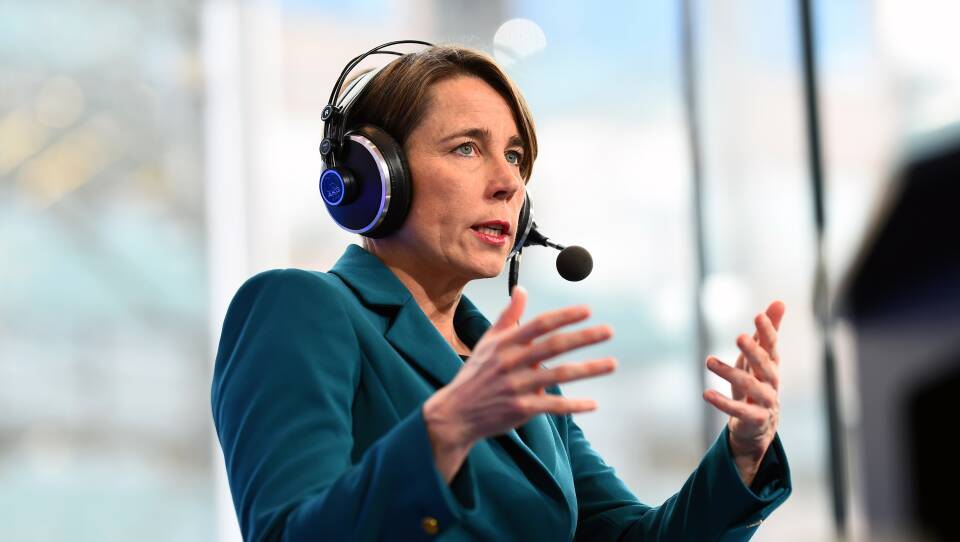Attorney General Maura Healey called on an Everett city councilor to resign in light of a series of racist statements.
Councilor Anthony DiPierro first started taking heat publicly when the public learned he had shared a racist meme in March. While Mayor Carlo DeMaria has stood by the councilor, saying he believes in second chances, pressure has been building for DiPierro to resign as another incident recently was made public. Just last week, The Boston Globe uncovered a video of DiPierro making comments with others in Everett city government about trying to bring Black people to public events so that they would be less likely to be perceived as racist.
"He should resign! People like that should not be serving in office, it's quite simple," Healey said to applause from the audience during Friday's taping of Boston Public Radio at the Boston Public Library.
"Whenever people are engaging in that kind of behavior, conduct, it's absolutely unacceptable," she added. "And it undermines and it weakens the legitimacy of bodies that are elected to represent and serve the people. And there's no place for racist commentary or actions. ... It seems like somebody doesn't have the decency to know that he should step down. But if he doesn't have the decency to know he should step down, that he should be made to step down."
Co-host Jim Braude asked Healey about the Everett councilor's statements after Healey expressed outrage over the white supremacy movement in the United States. Shockwaves ripped across the United States last weekend after a white teen traveled hundreds of miles to a grocery store in a predominantly Black area of Buffalo, New York, shooting and killing 10 people and injuring three more.
The attorney general and gubernatorial candidate said she was heartbroken for the families and survivors in Buffalo, as well as local Black communities once again processing news of targeted violence. She ultimately pointed her finger at white supremacy as a growing force in national politics.
"It is corrosive, it is killing our society, it is anti-democratic," she said. "There are people of goodwill who are working hard on this, but clearly we have to do a lot more in calling this out."
More Politics
During the wide-ranging discussion on Boston Public Radio, Healey also staked out actions she would take if elected governor. Among them: not signing a statewide rent-control bill if it came across her desk.
"I don't think that's a solution," she said. "I'm a big believer in making sure that those needing rental assistance have support. But I think the way you get there — the overall picture — it's not through rent stabilization, it's through the production of more housing."
A spokesperson for Healey's campaign contacted GBH News to clarify that Healey supports municipalities' rights to implement rent control policies, but that she does not support a statewide measure.
She also commented on reproductive rights. With the Supreme Court poised to overturn Roe v. Wade, Healey said Massachusetts needs to protect in-state abortion providers from lawsuits that could be filed under other states' restrictive abortion laws.
"Be ready to protect our providers, protect them from security threats, protect them from efforts to prosecute them or investigate them by other states for their actions. Protect them from civil and criminal liability when it comes to licensing or medical malpractice insurance," she said. "Because some of these laws, you know, in other states give private residents, private citizens in those states the right — the so-called right — to go after and investigate providers or those who are assisting others with abortions."
Providers and advocates have pointed to a new Connecticut law as a legislative model, which safeguards abortion providers from lawsuits under other states' bans.
Healey also called for the creation of a Massachusetts executive level "climate chief," who would coordinate climate efforts across the state's transportation, housing and economic development departments.
With seemingly endless disruptions and concerns plaguing the MBTA, which ultimately led to the federal transit authority taking on increased oversight, the attorney general said it's not just a safety problem, it's also an economic and environmental issue to get it remedied, and get people to the office in energy-efficient ways.
"There is something seriously wrong at the MBTA, and the federal government is investigating — I certainly welcome that and support that," Healey said.
Amid high COVID-19 transmission in the Bay State, Healey urged residents to take precautions but stopped short of endorsing a return of the mask mandate.
"I don't think we're there, but I also think we're at a point, Jim, as a practical matter, people are making their own decisions, mandate or not," she said.









